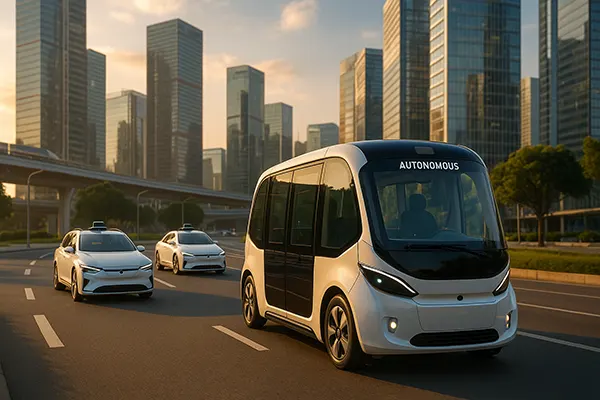
AI Architecture of Cities: How Artificial Intelligence Shapes Urban Planning
Urban development is entering a transformative phase driven by artificial intelligence. Cities across the globe are integrating AI into their planning frameworks to optimise traffic flow, reduce emissions, forecast energy demands, and create more liveable environments. The emergence of AI as a core component in urban design signals a shift in priorities—from reactive governance to proactive, data-driven infrastructure decisions.
Smart City Projects Leading the Way
Across Europe, cities like Barcelona, Helsinki, and Vienna are exemplifying how AI can enhance urban environments. These urban centres are integrating intelligent systems not only to manage resources but also to understand behavioural patterns of residents, enabling more accurate and inclusive planning.
In Barcelona, AI is embedded in traffic light coordination and waste management systems. The city has developed a centralised platform that collects real-time data from sensors to streamline operations. As a result, traffic congestion has dropped significantly during peak hours, while energy costs associated with waste collection have been reduced.
Helsinki’s Kalasatama district is a blueprint for AI-enhanced living. From automated lighting and heating controls in homes to AI-managed logistics in the local health centre, residents enjoy energy-efficient services and reduced response times. These smart services, underpinned by machine learning, are part of a larger goal to become carbon neutral by 2030.
Meanwhile, Vienna uses AI algorithms to simulate population growth and infrastructure stress. These simulations help city officials adjust zoning laws and public transport expansion plans with a level of precision that traditional models lack. Vienna’s open data policy further empowers researchers and developers to collaborate on smart initiatives.
Technological Hubs and Policy Alignment
AI success in cities depends on more than just sensors and software; it requires coherent policies and urban openness to innovation. In all three cities, public-private collaborations have ensured that ethical standards and legal frameworks evolve alongside technological advancement.
Barcelona’s Urban Lab acts as a testbed for AI applications before they’re deployed city-wide. Helsinki’s AI strategy involves citizens through digital feedback tools, ensuring inclusive development. Vienna’s governance model includes data protection protocols to maintain transparency and trust in AI deployment.
This alignment of technology with policy ensures scalability and adaptability of smart initiatives. Cities that plan with foresight and community input tend to deploy AI not just as a tool for efficiency but as a catalyst for equitable growth.
Optimising Mobility, Green Zones, and Energy
AI’s greatest strength in urban planning lies in its capacity to process and interpret large datasets quickly. This ability is critical in transport modelling, green infrastructure maintenance, and energy distribution networks. AI-driven insights are replacing trial-and-error approaches with real-time optimisation.
Predictive AI models allow transport agencies to reroute buses based on changing commuter patterns. In Copenhagen and Amsterdam, systems powered by AI are reducing bus idling and enhancing route efficiency by analysing GPS and weather data. This not only lowers fuel consumption but also boosts punctuality.
Green zones benefit from AI by using environmental sensors and satellite imagery to monitor air quality, soil moisture, and tree health. Algorithms identify areas that require maintenance, enabling sustainable urban landscaping. Similarly, AI-assisted irrigation systems respond dynamically to weather changes, conserving water resources.
When it comes to energy, AI helps forecast demand spikes and optimise distribution in smart grids. This is especially vital in integrating renewable energy sources. Cities like Munich are experimenting with AI to balance solar and wind inputs with consumption patterns in residential and commercial zones.
Dynamic City Ecosystems
Urban environments are dynamic and complex. AI allows planners to respond to this complexity through models that update continuously with real-world data. From adaptive traffic control to microclimate modelling, AI enables a shift from rigid infrastructure to flexible, resilient ecosystems.
These capabilities allow city managers to simulate future challenges—like heatwaves or population surges—and develop contingency measures. Cities such as Singapore use AI not just to address current inefficiencies but to simulate entire future districts before construction begins.
By creating digital twins—virtual models of urban systems—AI gives decision-makers a risk-free environment to test changes, assess impact, and avoid costly errors in the physical world.

Ethical and Social Implications of AI in Urban Life
Despite its potential, the use of AI in urban governance raises critical ethical questions. Chief among them is the “right to the city”—who decides what data is collected, how it is used, and whether residents benefit equitably from AI-enhanced governance.
Bias in algorithms can perpetuate existing inequalities. For instance, if predictive policing tools are trained on skewed historical data, they may target disadvantaged communities disproportionately. Ensuring that AI does not reinforce social divides requires transparent model auditing and inclusive policy-making.
Privacy is another significant concern. While AI systems often rely on data from smartphones, cameras, and IoT devices, the scope of data collection must be clearly communicated and limited to what’s essential. Residents must be able to opt out of tracking systems and have access to recourse if misused.
Ultimately, cities must strike a balance between innovation and accountability. Citizen participation, ethical design principles, and robust regulatory frameworks must guide AI integration to ensure it benefits the many—not just the technologically enabled few.
Citizen-Centred AI Governance
Several cities are pioneering participatory AI governance models. In Amsterdam, for instance, the Algorithm Register makes it possible for citizens to see which AI tools are in use and for what purpose. This empowers the public to hold governments accountable for data usage.
In Canada, Montreal’s Declaration for Responsible AI encourages municipalities to commit to ethical standards and transparency. Helsinki’s “MyData” initiative provides individuals control over their data, creating a cooperative framework between technology providers and residents.
These models show that AI does not have to be imposed from the top down. Rather, it can be co-created with communities, ensuring a more democratic and inclusive future for urban development.




